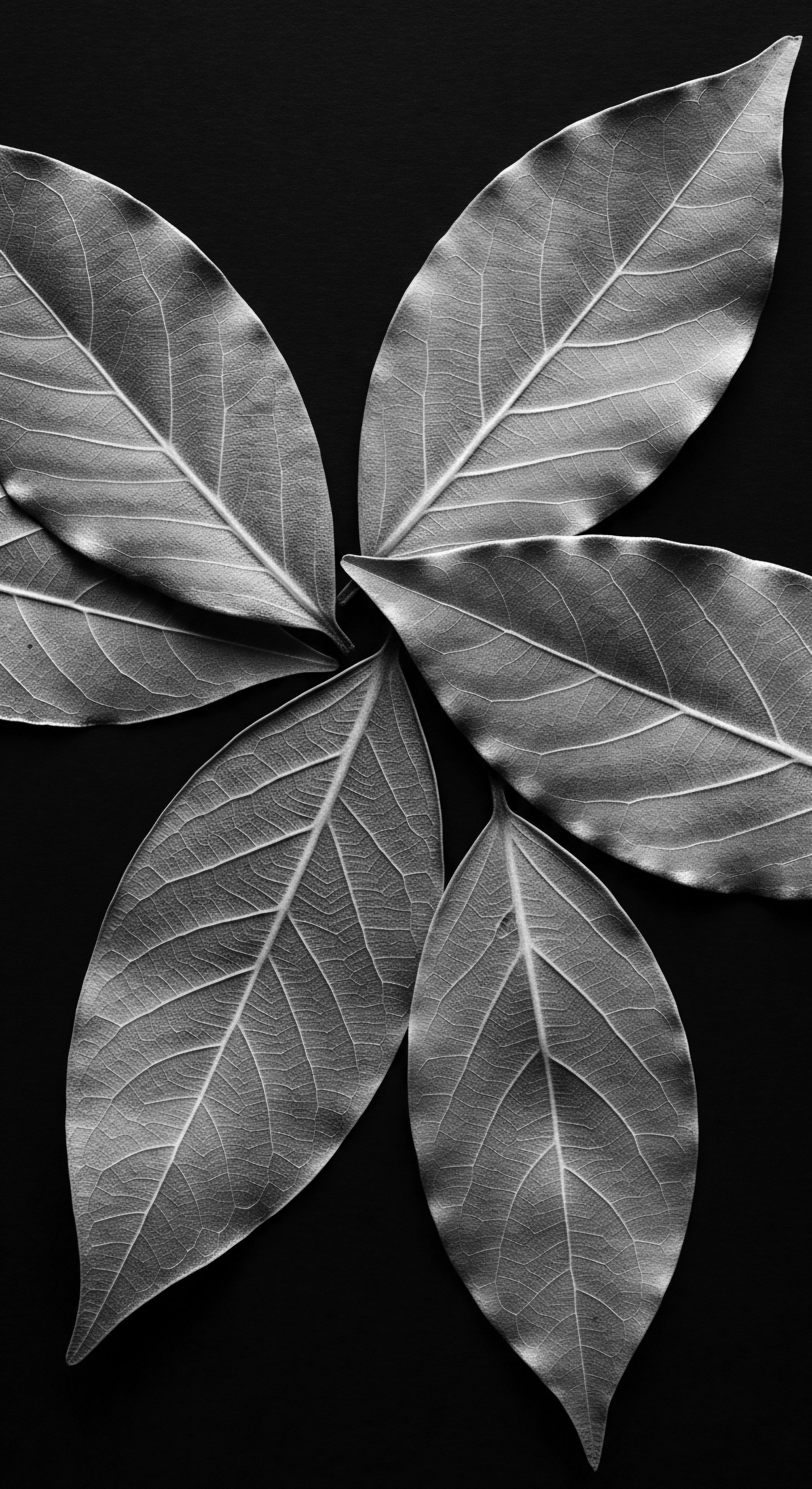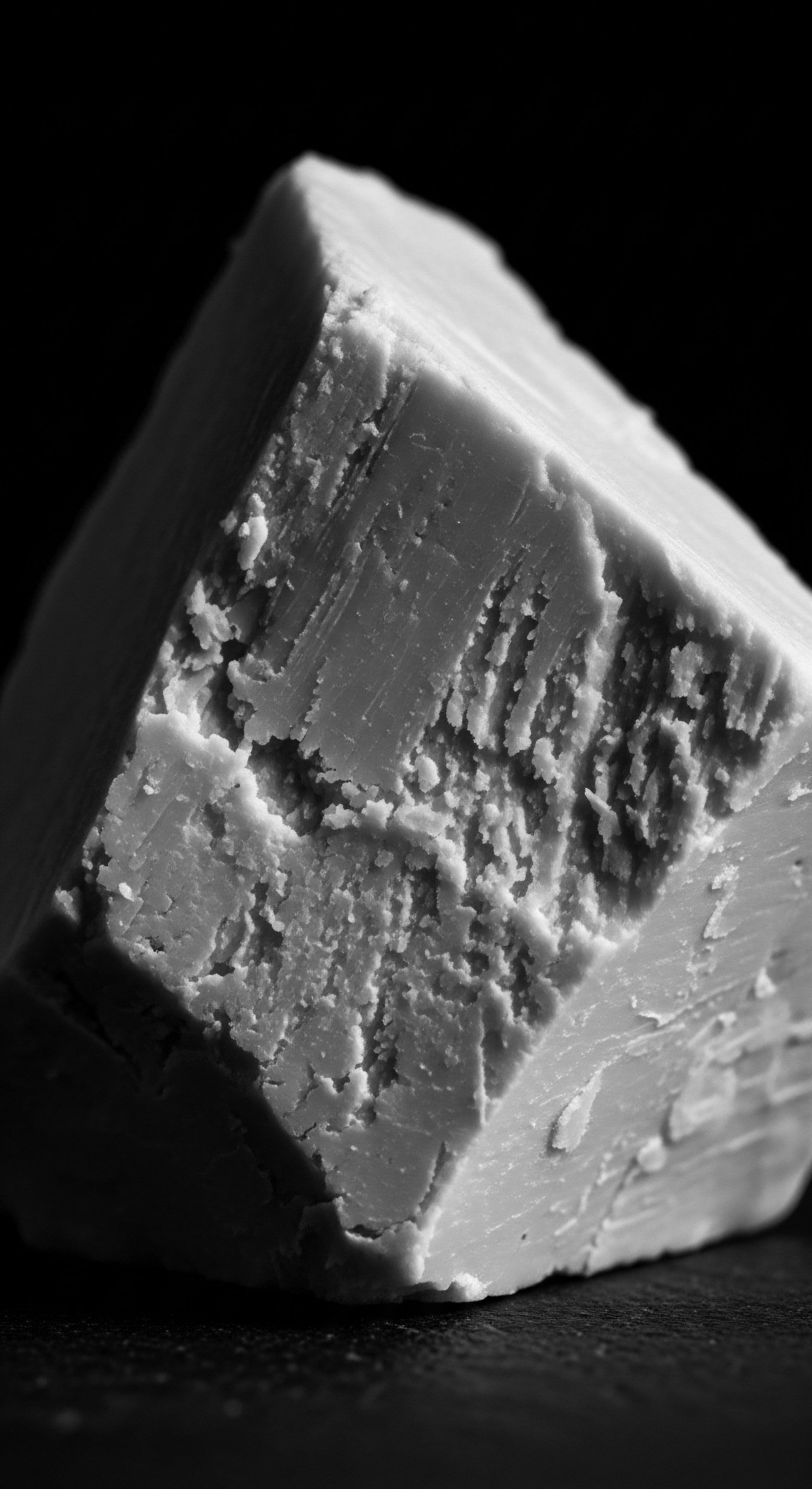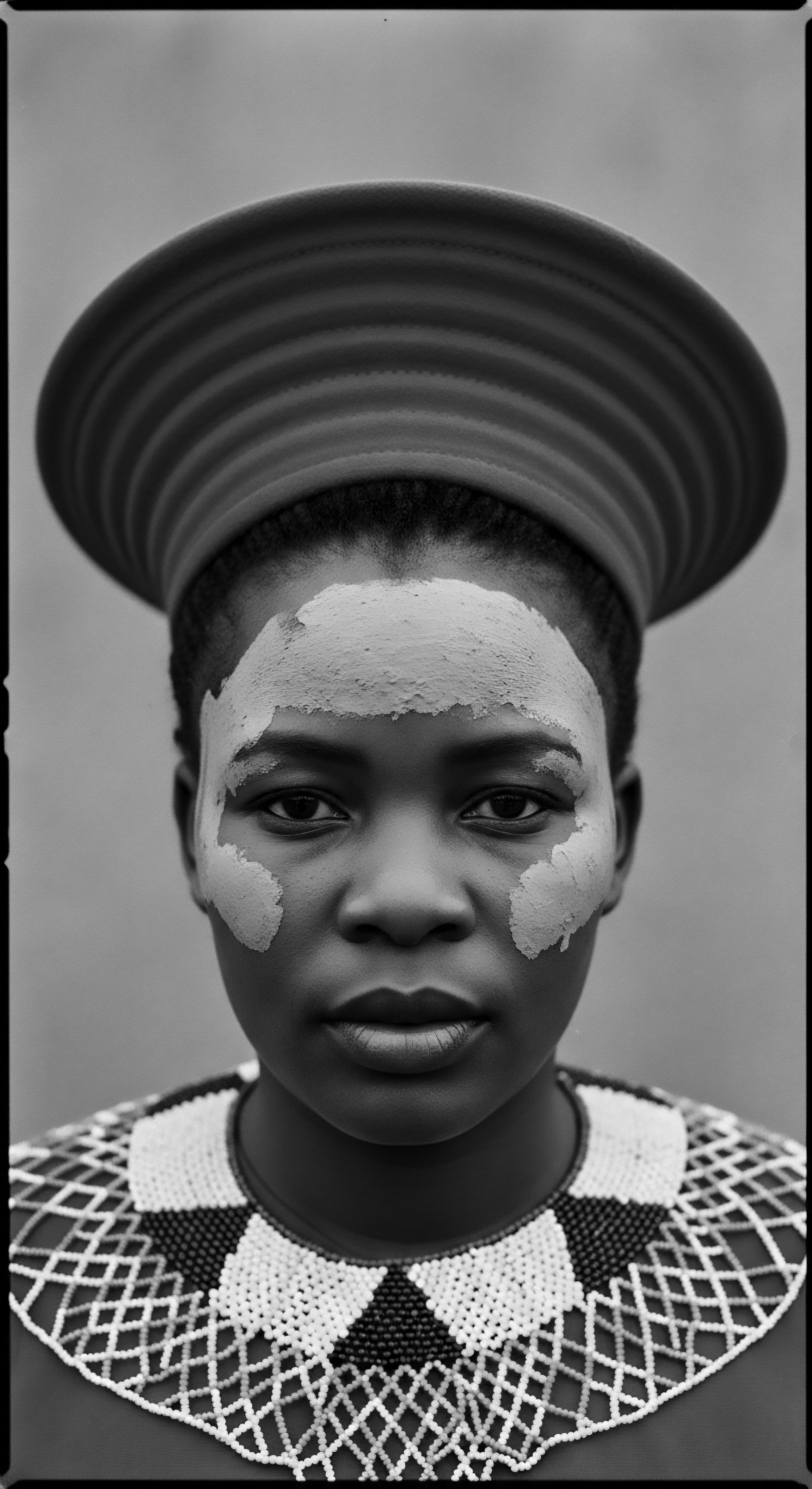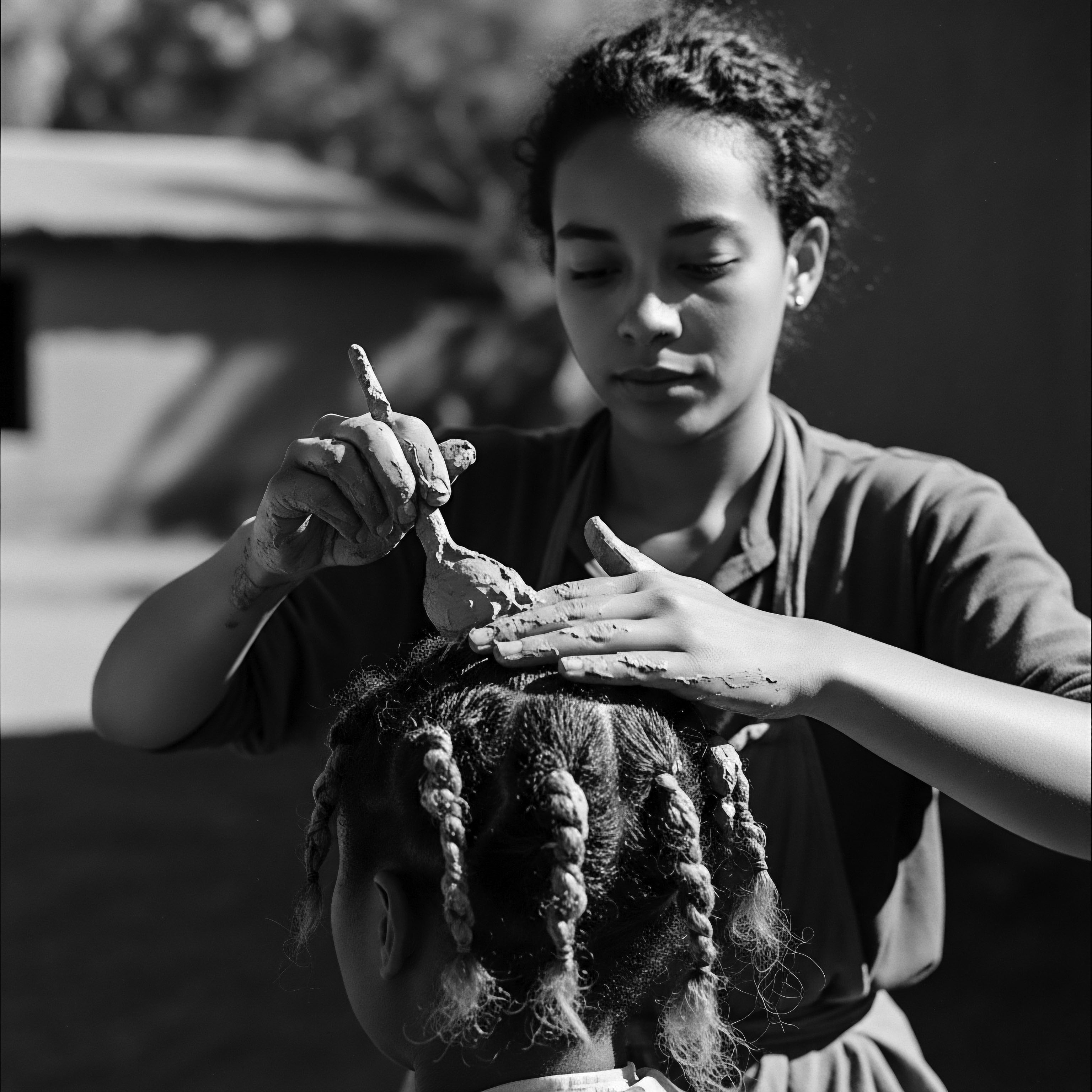
Fundamentals
Traditional Black Soap, often recognized by its deep, earthy hues and distinct aroma, serves as a cornerstone of ancestral cleansing practices, particularly for textured hair. It stands as a testament to the ingenuity and resourcefulness of West African communities, a cherished legacy passed through generations. This natural cleanser is a compound of elemental biology and time-honored human endeavor, a tangible link to the profound heritage of hair care.
At its very root, Traditional Black Soap represents a careful alchemy of plant matter and water, transforming humble botanical components into a potent cleansing agent. It is a product born from the land, reflecting an intimate understanding of natural properties. The creation process, though seemingly simple, involves precise steps that harness the inherent power of the earth’s offerings.
Traditional Black Soap embodies the enduring wisdom of West African ancestral practices, transforming natural elements into a profound cleanser for textured hair.
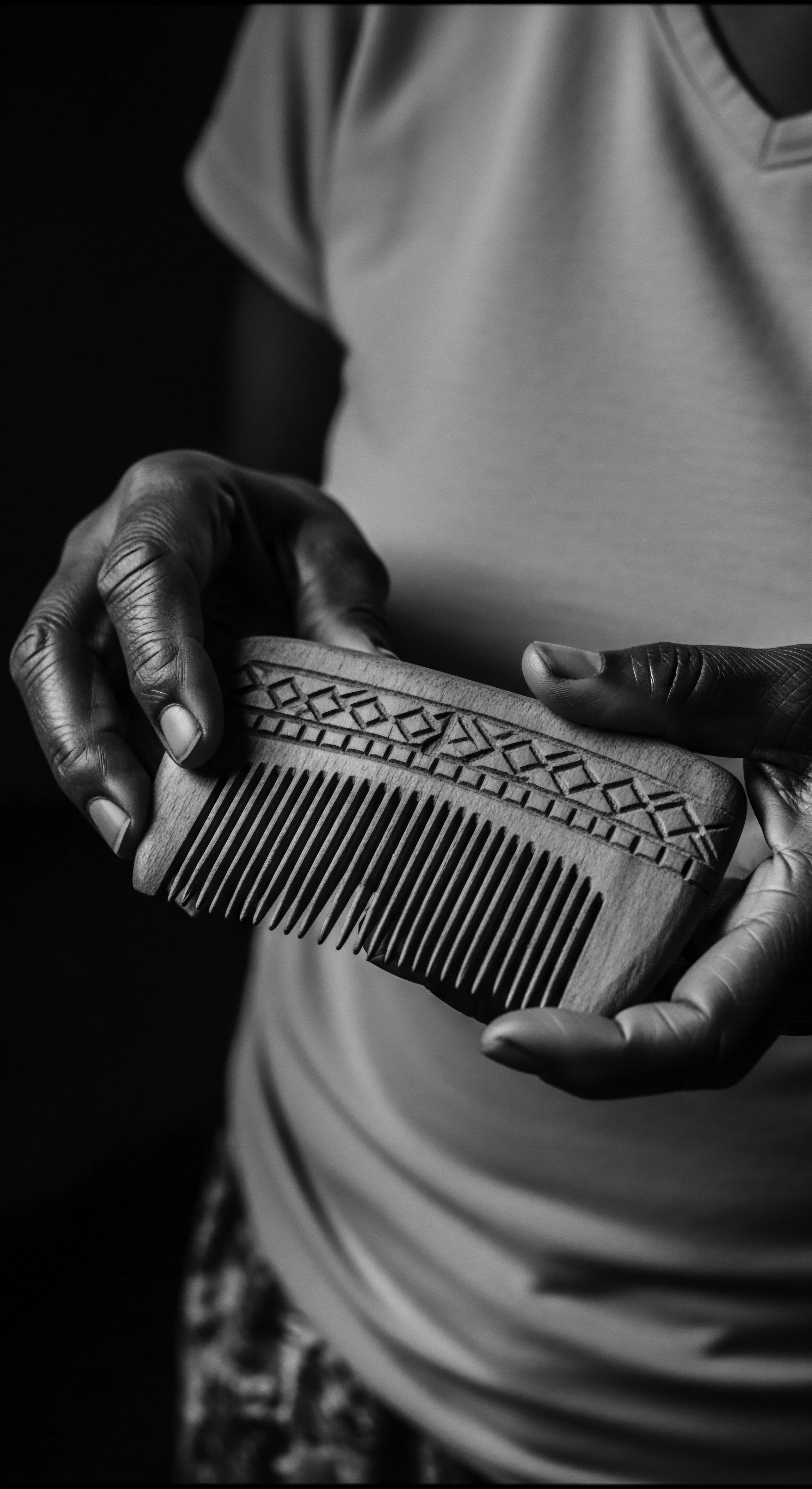
Origins and Elemental Composition
The genesis of Traditional Black Soap is deeply intertwined with the cultural fabric of various West African ethnic groups, notably the Yoruba people of Nigeria, the Ewe people of Ghana, and the Ashanti people of Ghana and Togo. For centuries, these communities have cultivated the knowledge and skill required to produce this remarkable substance. The earliest detailed accounts of its use trace back to the Yoruba, where it was known by names such as “ose dudu“.
In Ghana, it gained recognition as “alata samina,” often referencing the “pepper sellers” who traded it. This geographical and linguistic diversity underscores its widespread acceptance and adaptation across the region.
The core ingredients of Traditional Black Soap are a direct reflection of the local flora and agricultural bounty of West Africa. These include:
- Plantain skins ❉ These are a primary source of the alkaline component. Their rich potassium content contributes to the soap’s cleansing capabilities.
- Cocoa pods ❉ After the cocoa beans are harvested, the remaining pods are dried and burned, providing another vital source of ash.
- Palm kernel oil ❉ Extracted from the kernels of the palm fruit, this oil offers moisturizing and antibacterial properties.
- Shea butter ❉ Sourced from the nuts of the shea tree, this renowned butter is celebrated for its conditioning and soothing attributes, particularly beneficial for textured hair.
The preparation typically involves sun-drying and then roasting the plantain skins and cocoa pods in a clay oven to produce ash. This ash, rich in potassium carbonate, is then mixed with water to form a lye solution. This alkaline liquid is then combined with the natural oils and butters, undergoing a process known as saponification. This chemical reaction transforms the oils and the alkali into soap, a true testament to ancestral chemical understanding.
The mixture is then cooked and hand-stirred for extended periods, sometimes for as long as 24 hours, until it solidifies. Once cooled, the soap is cut into desired forms and allowed to cure, a period that can last several weeks.
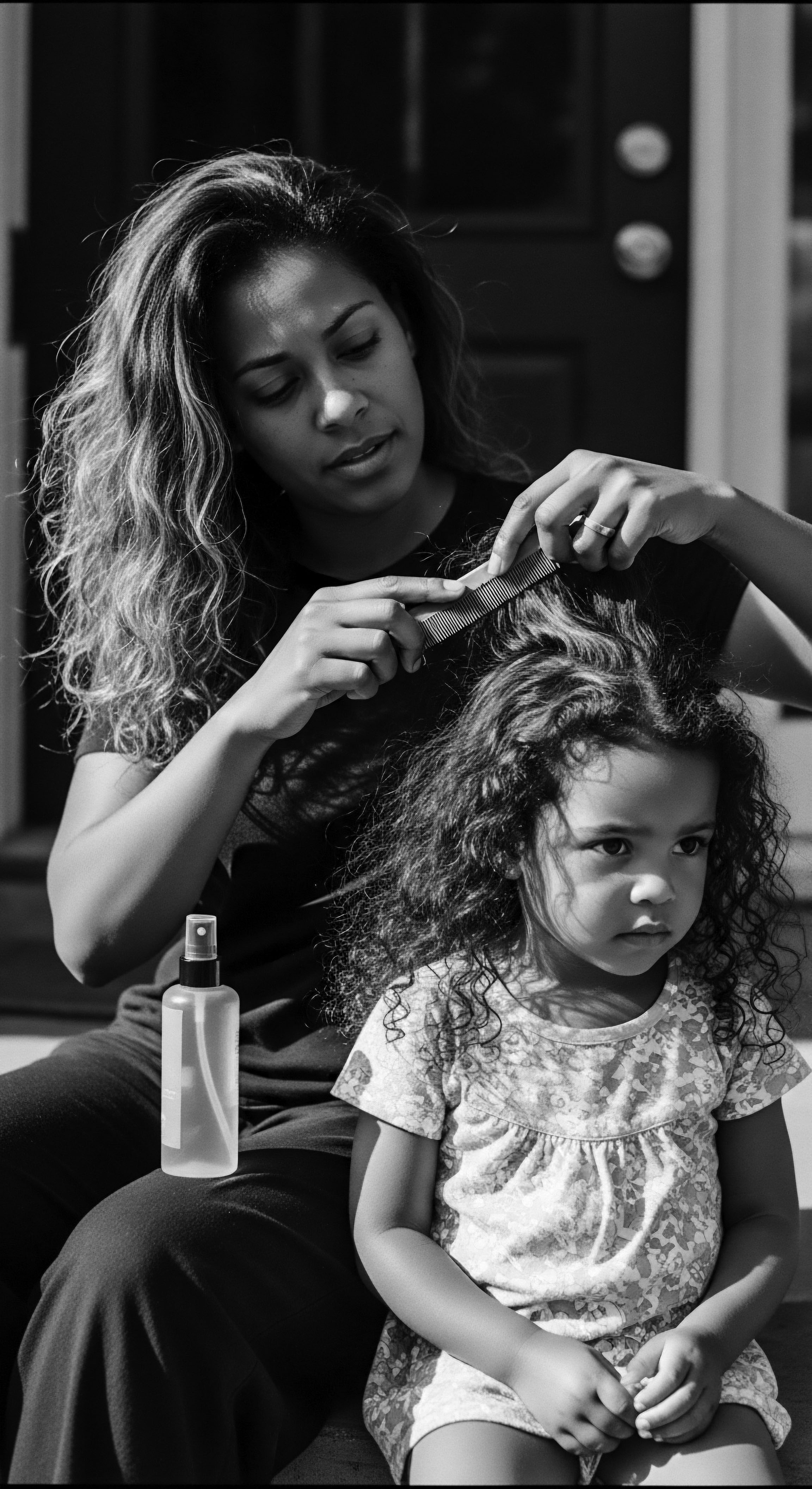
Initial Appreciation for Textured Hair
From its earliest applications, Traditional Black Soap was recognized for its profound benefits to hair and scalp. Its gentle yet effective cleansing action allows it to purify the scalp without stripping away the vital natural oils that are so precious to textured hair types. This is a crucial aspect, as many commercial cleansers can be overly harsh, leading to dryness and breakage, conditions that textured hair is particularly susceptible to. The natural emollients present in the oils and butters, such as shea butter and palm kernel oil, ensure that while cleansing occurs, a measure of conditioning remains, leaving hair feeling softer and more manageable.
The rich array of vitamins, particularly Vitamins A and E, and antioxidants naturally present in its plant-based ingredients, contribute to its nourishing profile. These components work in concert to support scalp health, which is the very foundation of vibrant hair growth. For individuals with textured hair, maintaining a healthy scalp is paramount, as conditions like dryness, itchiness, or flakiness can impede growth and cause discomfort. Traditional Black Soap’s historical application in addressing such concerns speaks to its inherent efficacy and its role as a nurturing agent for the hair strand’s journey from root to tip.
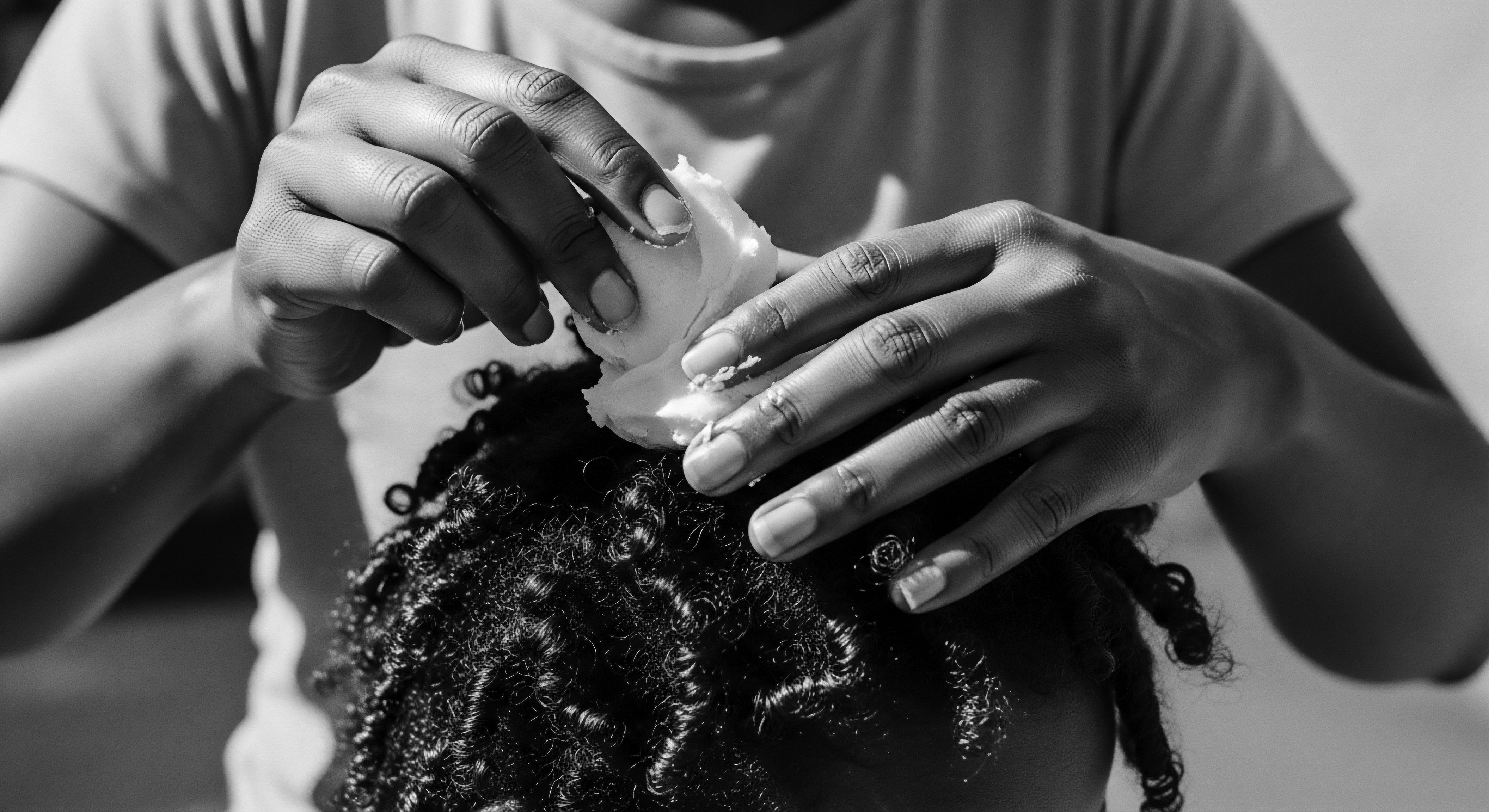
Intermediate
Moving beyond the foundational understanding, the intermediate appreciation of Traditional Black Soap deepens to encompass its intricate cultural practices and its enduring role within the vast and diverse landscape of textured hair heritage. It is not merely a cleansing agent; it is a living artifact, a tender thread connecting generations through shared rituals and collective memory. Its narrative extends into the very heart of community, shaping not only physical appearance but also spiritual and social identities.
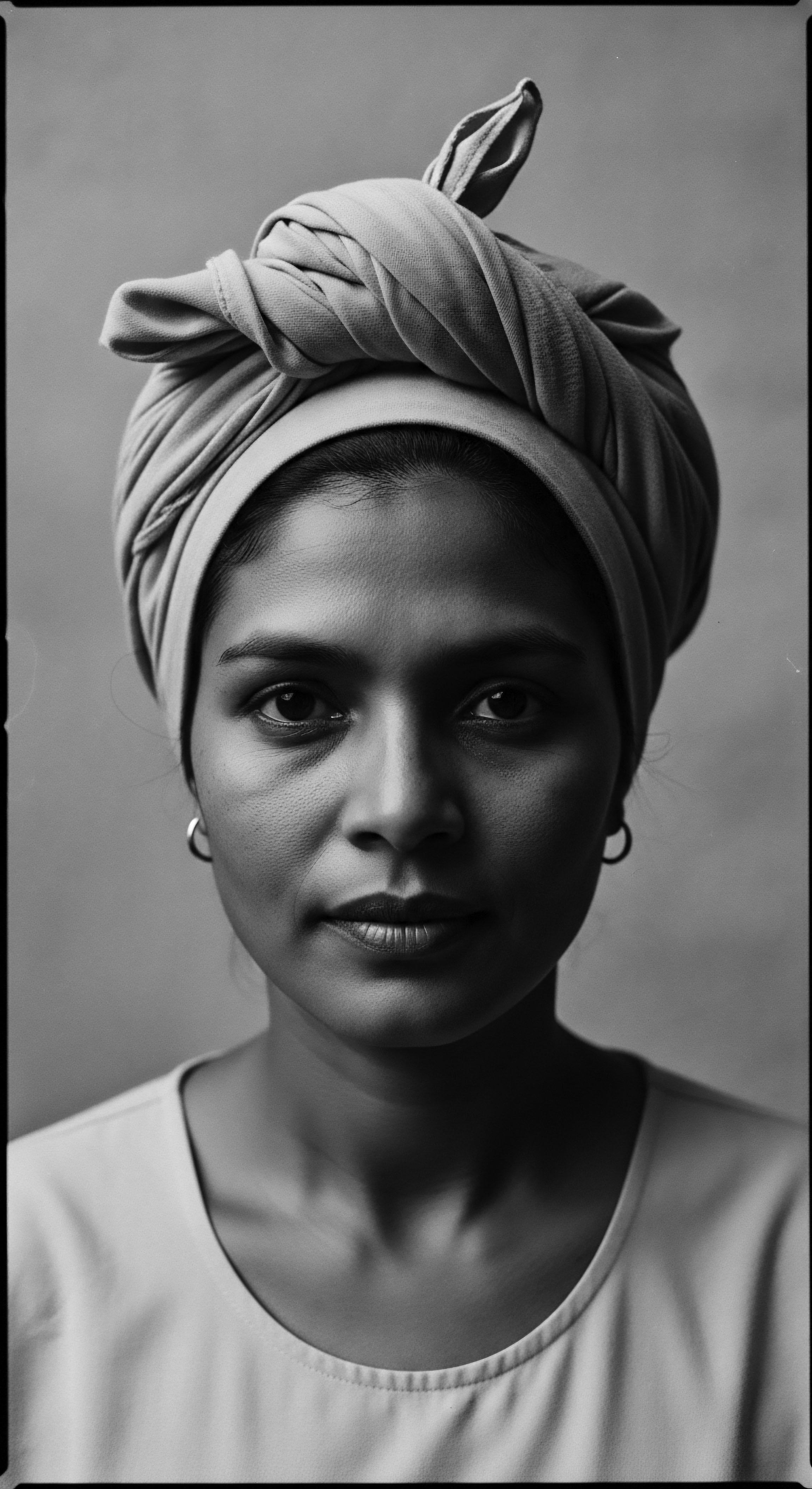
Cultural Constellations of Creation and Care
The making of Traditional Black Soap has historically been, and in many regions remains, a communal endeavor, predominantly carried out by women. This collective effort transcends simple production; it is a ritualistic act of shared labor, intergenerational knowledge transfer, and communal bonding. The intricate recipes, varying subtly from village to village, from family to family, are not codified in textbooks but rather reside in the hands and hearts of these women, passed down from mother to daughter for countless generations. This oral and practical transmission ensures the authenticity and continuation of an ancestral craft.
The communal crafting of Traditional Black Soap by women across West Africa represents a living library of ancestral knowledge, weaving cultural heritage into every lather.
The very act of preparing the soap becomes a space for storytelling, for teaching, for the quiet exchange of wisdom that extends beyond the precise measurements of ingredients. It is a testament to the collective strength and autonomy of these women, who, through their hands, have sustained not only their families’ hygiene but also a vital economic and cultural practice. The different names for the soap across various regions ❉ ”ose dudu” in Nigeria, “alata simena” in Ghana, and “sabulun salo” in Mali ❉ are not just labels, but linguistic markers of this deep, localized cultural ownership.

Beyond Cleansing: A Ritualistic Presence
Traditional Black Soap’s historical utility extends far beyond mere physical cleansing. Within many West African societies, it holds significant cultural and spiritual value, often employed in various rites and ceremonies. Its application symbolizes purity, renewal, and spiritual cleansing, a practice that aligns with the profound reverence for the body and spirit in these traditions. For instance, in some contexts, it might be used in purification rituals before significant life events or as a component of traditional healing practices.
For textured hair, this ritualistic presence carries particular weight. Hair in many African cultures is considered a sacred extension of the self, a conduit for spiritual energy, and a visual representation of one’s identity, status, and connection to ancestry. The careful cleansing of hair with Traditional Black Soap, imbued with the natural properties of the earth, became an act of honoring this sacred aspect of self. It was a preparatory step for intricate hairstyles that conveyed complex social messages, from marital status to tribal affiliation and even spiritual beliefs.
The inherent mildness and nourishing properties of Traditional Black Soap make it an ideal cleanser for the unique structural characteristics of textured hair. Unlike harsher lyes or chemical agents that might strip natural oils and compromise the hair’s delicate protein structure, the plant-derived alkali in Traditional Black Soap works in concert with the conditioning oils to cleanse while maintaining the hair’s integrity. This traditional approach safeguarded the vitality of hair, allowing it to be styled, braided, and adorned without excessive damage, a practice that has been crucial for centuries of textured hair expression.
The journey of Traditional Black Soap also parallels the historical movements of the African diaspora. As individuals were forcibly displaced, they carried with them not only their memories and resilience but also their ancestral knowledge, including hair care practices. While direct access to original ingredients might have been limited in new lands, the concept of a natural, plant-based cleanser for textured hair persisted, adapting to new environments and available resources. This enduring spirit of adaptation and preservation highlights the deep-seated cultural significance of Traditional Black Soap, not just as a product, but as a symbol of continuity and identity across vast geographical divides.
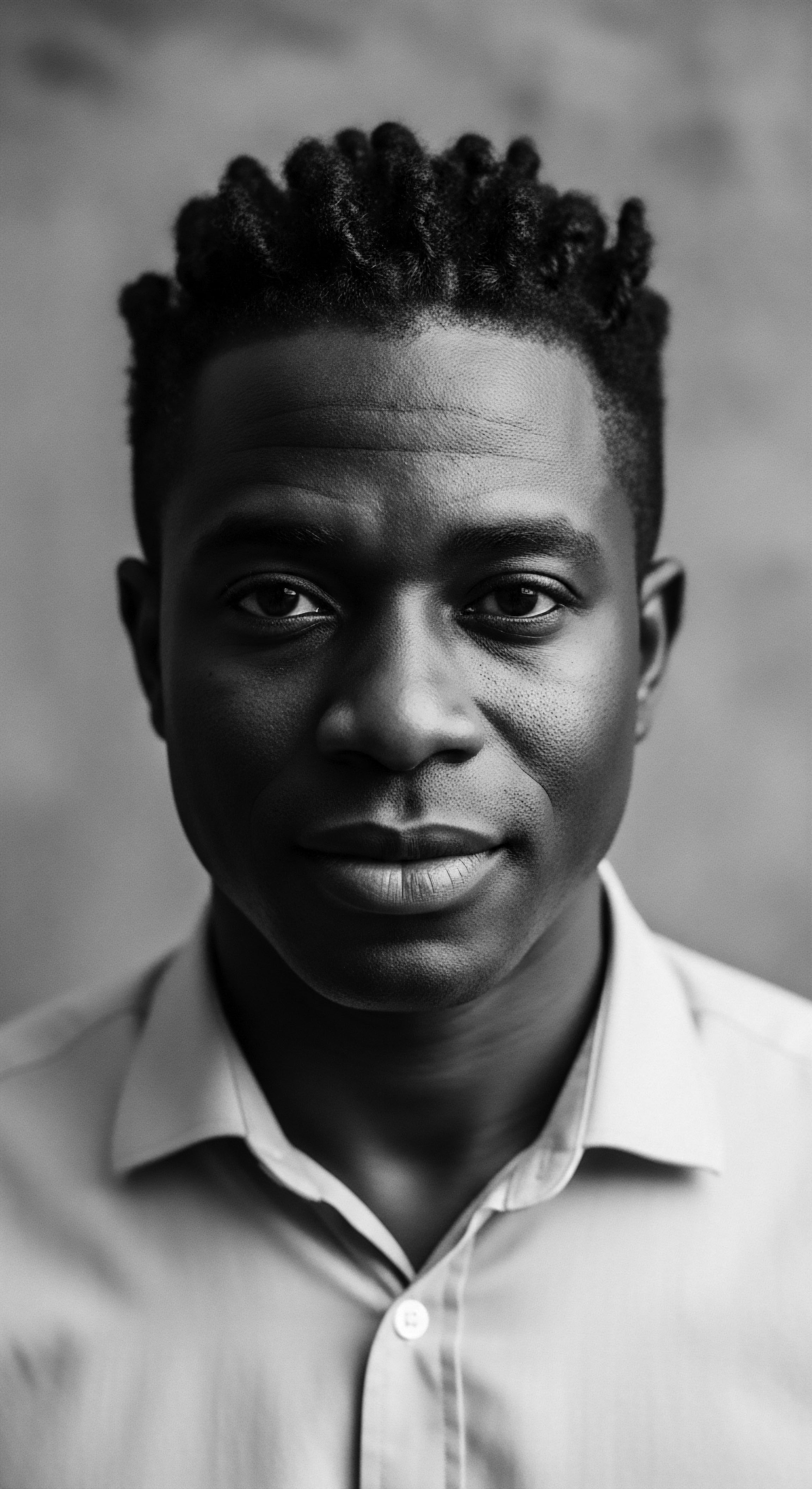
Academic
The academic delineation of Traditional Black Soap necessitates a rigorous examination, transcending superficial descriptions to probe its deep scientific underpinnings, its intricate socio-economic dimensions, and its profound historical trajectory within the human experience, particularly as it relates to textured hair heritage. This is not merely a cosmetic item; it is a complex ethnobotanical product, a cultural artifact, and a testament to indigenous scientific knowledge.
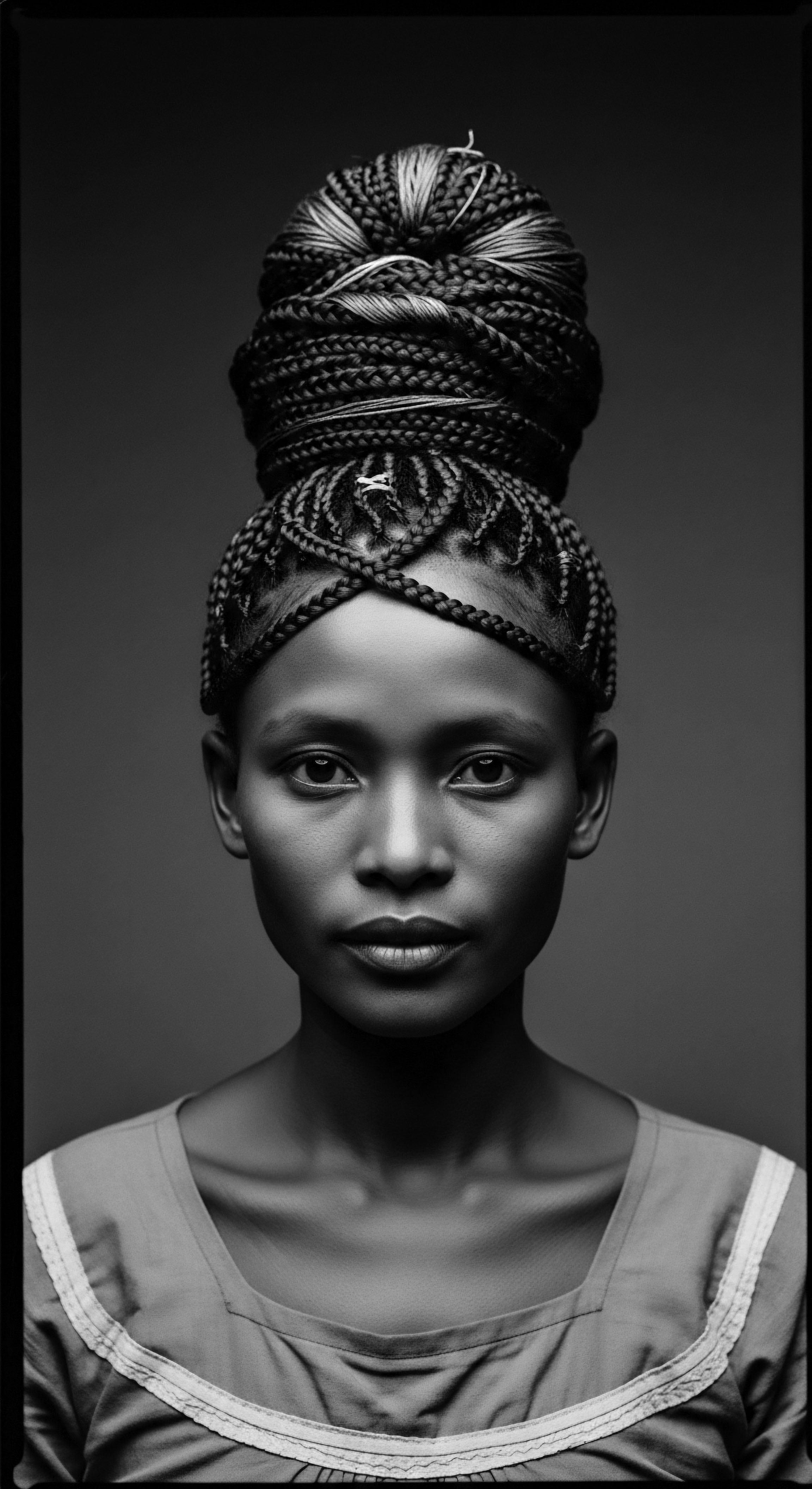
The Precise Meaning of Traditional Black Soap: A Multidisciplinary Perspective
Traditional Black Soap, often referred to by its indigenous names such as ose dudu (Yoruba) or alata samina (Ghanaian), is a naturally occurring, saponified cleansing agent primarily originating from West Africa. Its meaning extends beyond a mere cleansing function, encompassing its ethnobotanical composition, its socio-cultural production paradigms, and its historical role in holistic wellness and identity formation within Black and mixed-race communities. It represents a complex interplay of traditional ecological knowledge, rudimentary chemistry, and communal resourcefulness, yielding a product whose cleansing efficacy is coupled with conditioning attributes, rendering it particularly suited for the unique structural and physiological requirements of textured hair types. The term delineates a product distinct from modern, industrially manufactured soaps, distinguished by its alkaline source derived from plant ash and its unrefined, lipid-rich profile, which collectively contribute to its characteristic appearance, texture, and therapeutic properties.

Echoes from the Source: Elemental Biology and Ancient Practices
The genesis of Traditional Black Soap lies in a sophisticated, albeit empirically derived, understanding of basic chemistry. The core principle involves saponification, the chemical reaction that transforms fatty acids into soap when combined with an alkali. In the context of Traditional Black Soap, this alkali is not a commercially synthesized lye but rather a naturally occurring potash, meticulously extracted from the ashes of various plant materials. This distinction is paramount, as the specific plant matter chosen profoundly influences the soap’s final composition and properties.
The primary plant sources for this essential ash include:
- Plantain peels (Musa paradisiaca): These are a significant source, yielding ash rich in potassium carbonate.
- Cocoa pods (Theobroma cacao): The husks, often considered agricultural waste, provide another potent source of alkaline ash.
- Palm tree leaves (Elaeis guineensis) and shea tree bark (Vitellaria paradoxa): These contribute to the ash composition, further diversifying the mineral content.
The meticulous process involves sun-drying these plant parts, followed by slow roasting in clay ovens until they are reduced to ash. This ash is then steeped in water, and the resulting liquid is filtered to obtain the lye solution. Research indicates that the liquid extract from cocoa-pod ash can contain as much as 56.73% +/- 0.16% potassium carbonate, a testament to the high alkaline yield of these traditional methods. This potassium-rich lye reacts with various locally sourced vegetable oils, including palm kernel oil, coconut oil, and shea butter.
These oils are abundant in fatty acids such as lauric, myristic, oleic, palmitic, and stearic acids, which are transformed into soap molecules during the extended hand-stirring and cooking process. The inherent alkalinity, typically ranging between pH 8.5 and 10, is carefully balanced by the lipid content, ensuring effective cleansing without excessive harshness. This chemical equilibrium, achieved through ancestral empirical knowledge, underscores the sophisticated nature of this traditional craft.
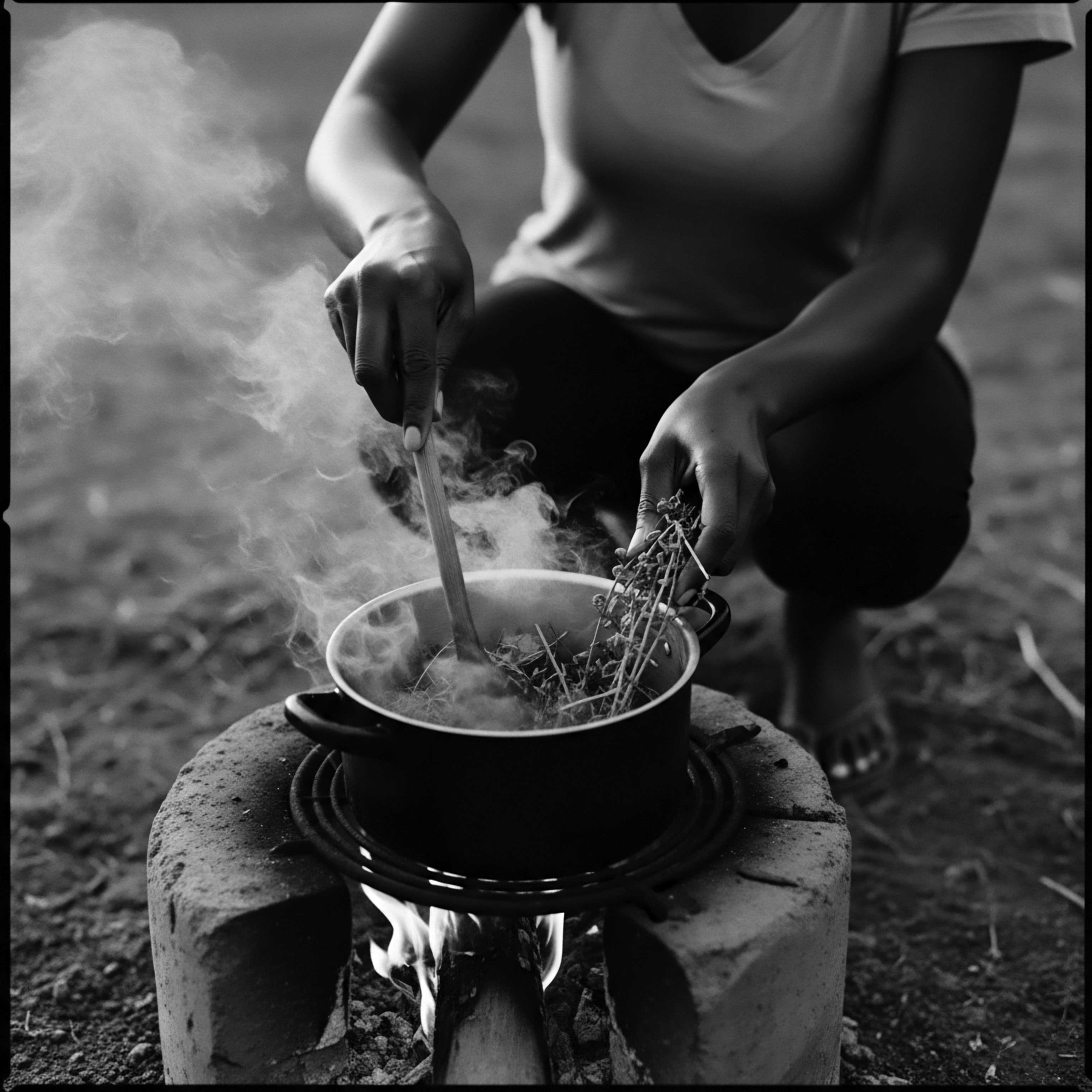
The Tender Thread: Living Traditions of Care and Community
The production of Traditional Black Soap is not merely a manufacturing process; it is a deeply embedded social practice, a vibrant living tradition that sustains communities and reinforces cultural identity. It is overwhelmingly an enterprise led by women, whose collective labor and inherited wisdom drive its creation. This female-centric production model has historical roots, contributing significantly to the economic autonomy and social standing of women in West African societies. As Raji et al.
(2013) observed, the black soap enterprise was an industry exclusively meant for women, contributing meaningfully to their livelihoods in rural Nigeria. This economic dimension provides a powerful lens through which to understand its enduring significance.
The transmission of soap-making knowledge is inherently intergenerational, flowing from grandmothers to mothers to daughters, a testament to the power of oral tradition and embodied learning. This continuous chain of instruction preserves not only the precise formulations but also the communal spirit and ritualistic aspects of its creation. The very act of preparing the soap becomes a communal gathering, fostering social cohesion and allowing for the sharing of stories, songs, and wisdom that extend far beyond the technicalities of soap production. This collective heritage reinforces the understanding that personal care is intrinsically linked to community wellbeing.
Traditional Black Soap’s journey through the diaspora reveals a resilient cultural practice, valued for its effectiveness even when colonial powers sought to suppress its economic influence.
For textured hair, the deep heritage of Traditional Black Soap manifests in its consistent use within ancestral hair care rituals. Hair in many African cultures holds immense symbolic weight, representing lineage, social status, spiritual connection, and even the ability to bear healthy children. The careful cleansing and preparation of hair were, and remain, acts of reverence.
Traditional Black Soap, with its gentle yet effective cleansing properties and inherent moisturizing elements, supported the integrity of diverse textured hair patterns, from tightly coiled braids to intricate threaded styles. It allowed for the maintenance of hair health, which was crucial for the elaborate styling that communicated complex social messages.
A compelling historical example of Traditional Black Soap’s esteemed position, even in the face of external economic pressures, can be observed in early European encounters with West African trade. Accounts from the 17th century, such as those by Awnsham Churchill in “A Collection of Voyages and Travels. “, note that the Portuguese valued West African black soap for its effectiveness. However, they deliberately refrained from introducing this highly effective soap to Portugal.
This strategic decision was not due to a lack of quality, but rather a calculated economic maneuver to avoid disrupting their own burgeoning local soap-making industry. This historical anecdote powerfully illuminates the superior efficacy of Traditional Black Soap, recognized even by competing markets, and highlights the deliberate suppression of indigenous African products to protect European commercial interests. It underscores the intrinsic value of Traditional Black Soap, which was so potent that it posed a competitive threat to established industries, a testament to its unparalleled quality rooted in ancestral methods.
The enduring practice of Traditional Black Soap production also had a measurable economic impact. While exact historical figures are challenging to quantify comprehensively, the production and trade of ingredients like palm oil, a key component, were significant. For instance, palm oil became a principal export item from West Africa, used not only in soap production but also as a machine lubricant and in food processing industries, particularly after 1850. The sustained demand for Traditional Black Soap within West African communities and its eventual introduction to global markets, often facilitated by women traders and fair trade groups, speaks to its economic viability and its contribution to local economies.
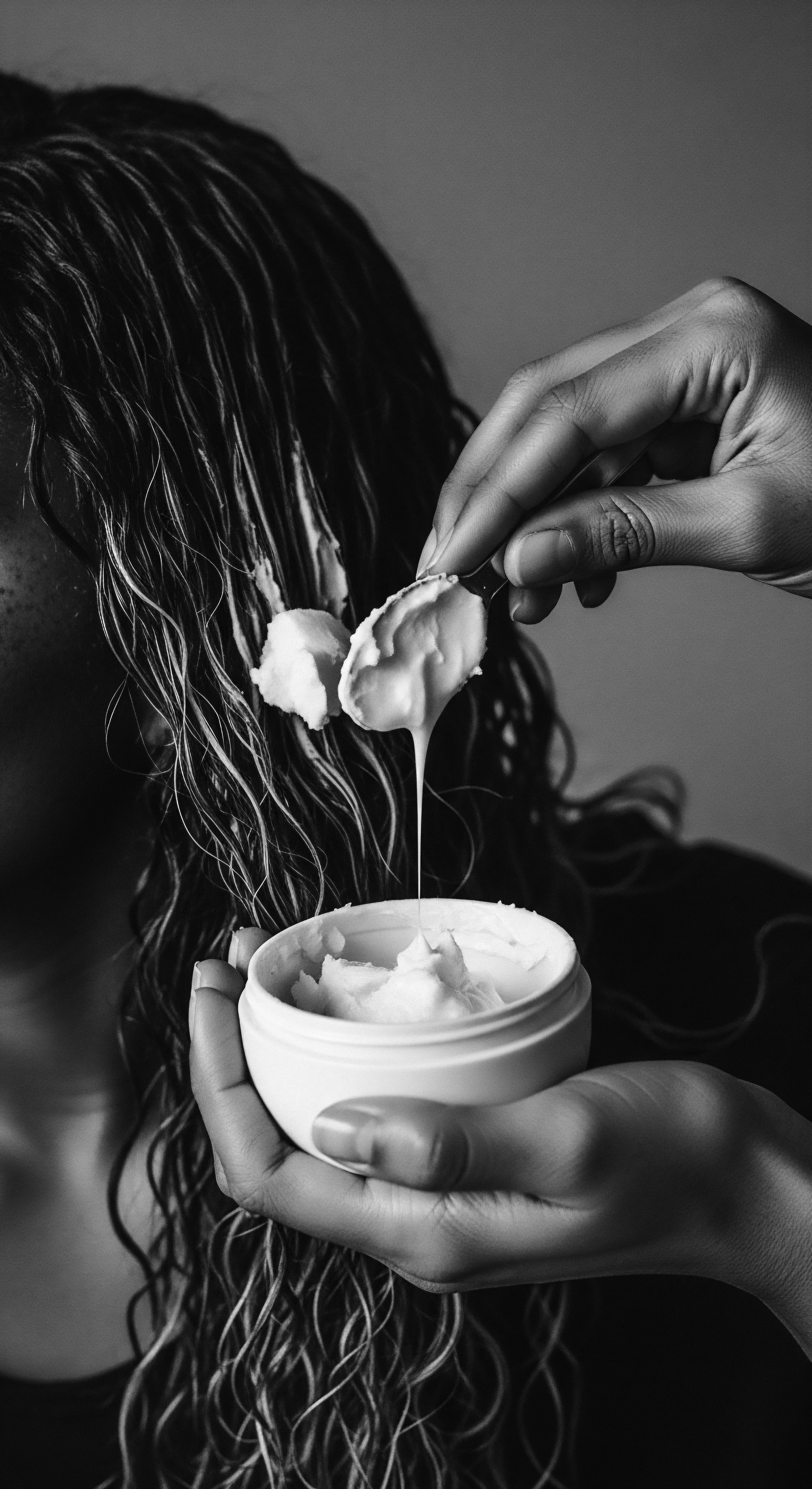
The Unbound Helix: Voicing Identity and Shaping Futures
The journey of Traditional Black Soap from communal hearths to global recognition symbolizes a broader narrative of resilience, cultural reclamation, and the reassertion of identity within the Black and mixed-race diaspora. In a world where Eurocentric beauty standards historically marginalized textured hair, Traditional Black Soap stands as an unwavering beacon of ancestral wisdom and self-acceptance. Its very existence challenges the imposed narratives of deficiency, asserting the inherent beauty and strength of natural hair.
In contemporary times, Traditional Black Soap plays a pivotal role in the natural hair movement, serving as a touchstone for individuals seeking authentic, heritage-informed care for their coils, curls, and waves. Its popularity reflects a conscious choice to reconnect with ancestral practices and to move away from synthetic products that often contradict the needs of textured hair. This movement is not simply about aesthetics; it is a profound act of self-love and cultural affirmation. The soap’s natural composition, devoid of harsh chemicals, aligns perfectly with the ethos of holistic wellness and mindful consumption that defines this contemporary shift.
The continued production and global trade of Traditional Black Soap also carry significant implications for ethical sourcing and fair trade. Many authentic black soaps are still handcrafted by women’s cooperatives in West Africa, such as those in Tamale, Ghana. Supporting these products means contributing directly to the economic empowerment of these communities, upholding the legacy of their craft, and ensuring that the benefits of this ancestral knowledge flow back to its origins. This economic reciprocity reinforces the value of traditional practices in a globalized market, shaping a future where heritage and commerce can coexist respectfully.
The enduring meaning of Traditional Black Soap for textured hair lies in its capacity to serve as a bridge between past and present. It is a tangible link to the ingenuity of ancestors, a reminder of the deep knowledge embedded in the earth, and a tool for nurturing hair in a way that honors its unique ancestral story. Its continued presence in hair care routines across the diaspora affirms that the wisdom of generations past remains profoundly relevant, guiding us towards a future where textured hair is celebrated in all its natural glory. The “unbound helix” of textured hair finds its freedom and strength not in conformity, but in the enduring, heritage-rich care embodied by Traditional Black Soap.
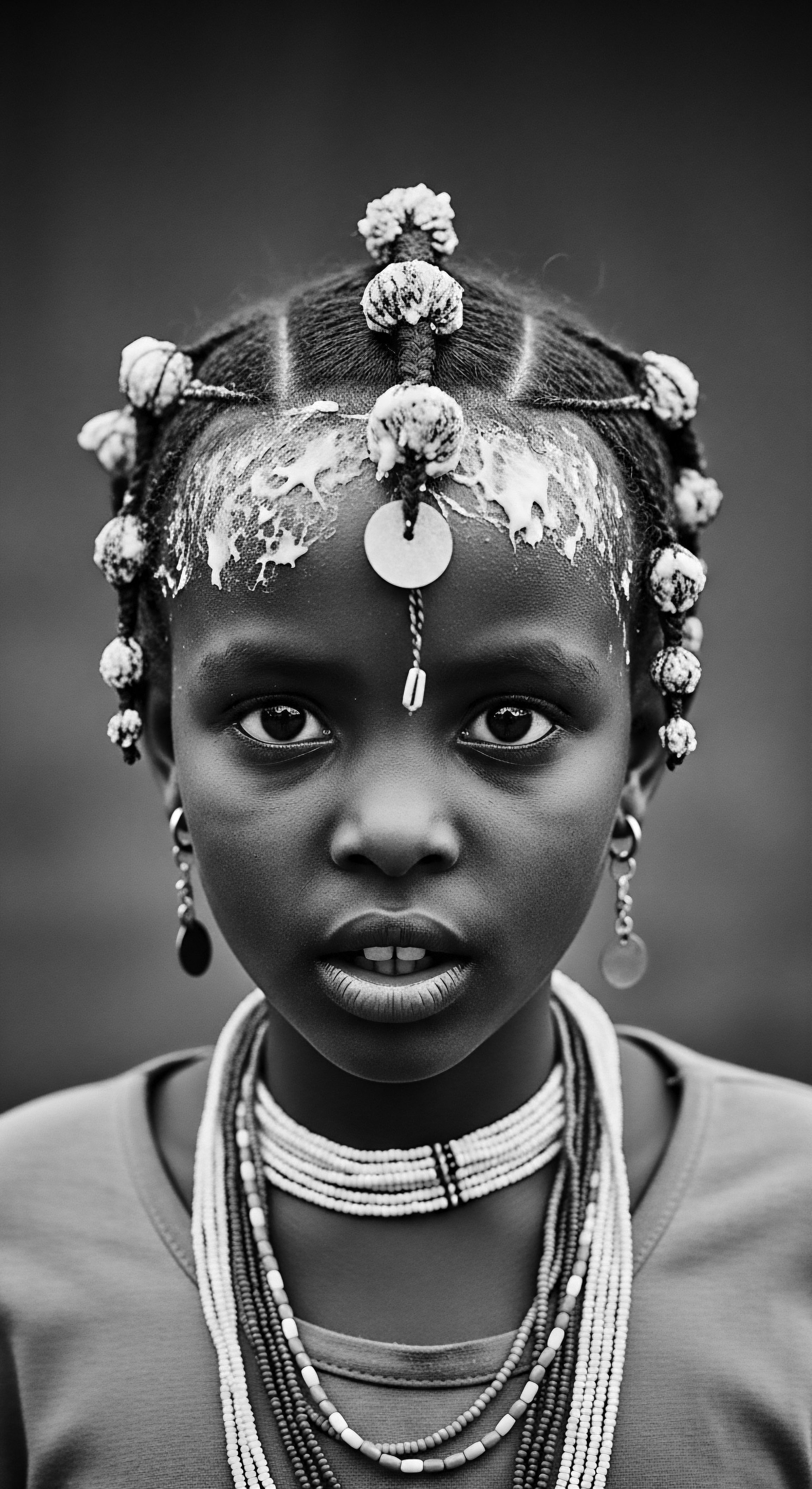
Reflection on the Heritage of Traditional Black Soap
The narrative of Traditional Black Soap, as etched into Roothea’s living library, offers a profound meditation on the enduring legacy of textured hair and its care. It is a testament to the resilience of ancestral wisdom, a vibrant echo from the very source of human ingenuity. We have traced its journey from the elemental alchemy of plant ash and natural oils, through the tender threads of communal creation and ritualistic application, to its role in voicing identity and shaping the unbound helix of future generations.
This remarkable cleanser stands as more than a product; it is a cultural anchor, deeply steeped in the soil and spirit of West Africa. Its continued presence in the hands of those who honor textured hair is a daily reaffirmation of a heritage that refused to be silenced or erased. It reminds us that true wellness for hair is not found in fleeting trends, but in the time-tested practices that respect the hair’s inherent structure and its ancestral story.
The careful selection of ingredients, the communal hands that stir the mixture, the patient curing under the sun ❉ each step in the creation of Traditional Black Soap is a deliberate act of preserving a lineage of care. It speaks to a holistic understanding of beauty, one that recognizes the interconnectedness of body, spirit, community, and the earth. For those with textured hair, Traditional Black Soap offers not just cleansing, but a reconnection to a profound past, a gentle reminder of the strength and beauty inherited through generations. It is a whisper of ancestral hands, guiding us towards a future where every strand is celebrated as a living testament to an unbroken legacy.

References
- Adebowale, O. A. (2014). The economic contribution of rural women to community development through handicrafts. Journal of Rural Development and Planning, 7(2), 45-58.
- Churchill, A. (1704). A Collection of Voyages and Travels, Some Now First Printed from Original Manuscripts, Others Now First Published in English. Awnsham Churchill.
- Olajuyigbe, O. O. Adeoye-Isijola, M. O. & Adedayo, O. (2017). A comparison of the antibacterial activity of traditional black soap with some commercial soaps. Journal of Pharmaceutical and Allied Sciences, 14(2), 2509-2516.
- Oyekanmi, A. M. (2018). Physiochemical Properties of African Black Soap, and It’s Comparison with Industrial Black Soap. Scientific & Academic Publishing, 8(1), 1-5.
- Raji, S. O. Olatunji, S. O. & Adeyemo, A. A. (2013). Black soap enterprise: A veritable tool for women empowerment in rural areas of Nigeria. International Journal of Academic Research in Business and Social Sciences, 3(10), 22-30.
- Taiwo, O. O. & Osinowo, A. A. (2012). Assessment of the alkali contents of palm bunch ash of three species of oil palm. International Journal of Scientific & Engineering Research, 3(10), 1-5.
- White, L. (2000). Speaking with Vampires: Rumor and History in Colonial Africa. University of California Press.
- Omotos, A. (2018). The Cultural Significance of Hair in Ancient African Civilizations. Journal of Pan African Studies, 11(2), 1-15.
- Gordon, M. (2009). The Hair Story: Untangling the Roots of Black Hair in America. St. Martin’s Press.
- Akerele, O. (1993). The use of African medicinal plants in traditional health care. World Health Organization.

